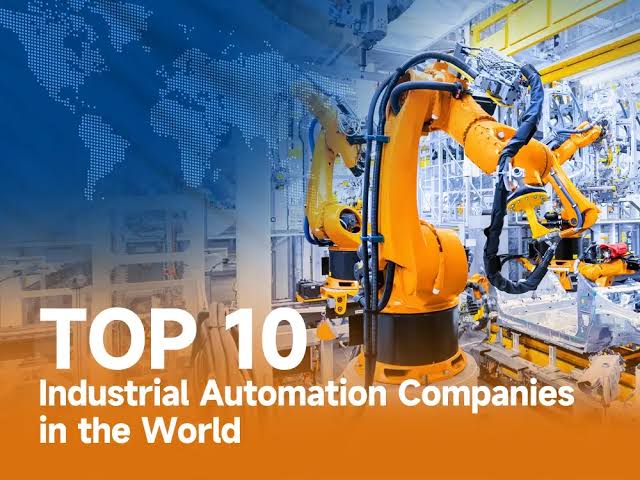Industrial automation in 2025 is more than just about machinery—it is a fusion of data, connectivity, and intelligence. The systems listed above are setting benchmarks in precision, reliability, and innovation.
The rise of industrial automation has revolutionized modern manufacturing and production processes. Companies across various sectors now rely on automation systems to improve productivity, enhance precision, and reduce operational costs. As of 2025, industrial automation continues to evolve with greater integration of smart technologies, AI, IoT, and robotics. Below are the top 10 industrial automation systems dominating the global market today, based on their performance, adaptability, and innovation.
10. Rockwell Automation (Allen-Bradley)
Rockwell Automation’s Allen-Bradley brand remains a powerful force in the automation world. Known for its reliability and extensive product line, it supports industries such as oil and gas, automotive, food processing, and energy.
Its programmable logic controllers (PLCs), human-machine interfaces (HMIs), and intelligent motor control systems are among the most widely used in the United States and globally. The company’s FactoryTalk software provides a strong foundation for real-time monitoring and operational analytics.
With an increasing focus on industrial cybersecurity and smart factory solutions, Rockwell Automation continues to set a strong standard for flexible and secure automation infrastructure.
9. Mitsubishi Electric
Mitsubishi Electric provides a broad range of industrial automation systems, including advanced robotics, CNC controls, servo motors, and factory automation software.
The brand’s iQ Platform unifies control systems, improving productivity and efficiency for manufacturers. It is particularly popular in the Asia-Pacific region, where high-speed and compact automation is in high demand.
Mitsubishi’s focus on artificial intelligence and sustainable manufacturing makes it a competitive player in modern factory digitization.
8. Bosch Rexroth
Bosch Rexroth delivers powerful solutions in motion control and drive technology. Their automation systems are especially well-regarded in industries like automotive, packaging, and heavy machinery.
Their ctrlX AUTOMATION platform is designed with flexibility and openness in mind, supporting a wide range of control tasks while integrating IoT and cloud-based analytics.
Bosch Rexroth is also pushing the boundaries of energy-efficient automation systems, helping companies meet environmental regulations and reduce carbon footprints.
7. ABB Automation
ABB is a well-established name in global industrial automation, particularly in robotics, electrification, and control systems. Their distributed control systems (DCS) are widely adopted in sectors like chemicals, mining, utilities, and marine.
ABB’s Ability digital platform provides advanced cloud connectivity, remote monitoring, and predictive maintenance features. Their range of collaborative robots, known as YuMi, is redefining safe human-robot interactions.
In 2025, ABB continues to lead in intelligent automation by combining machine learning and real-time data for smarter decision-making.
6. Siemens Industrial Automation
Siemens offers one of the most comprehensive industrial automation portfolios in the world. Their Totally Integrated Automation (TIA) framework covers everything from field sensors to control systems and cloud integration.
Products like SIMATIC PLCs, SINAMICS drives, and MindSphere—Siemens’ cloud-based IoT operating system—allow for seamless data flow across all levels of the manufacturing process.
The company’s commitment to Industry 4.0 solutions and digital twin technologies has positioned it as a leader in end-to-end smart automation systems.
5. Schneider Electric
Schneider Electric has built a solid reputation for automation systems that prioritize energy efficiency and sustainability. Their EcoStruxure platform supports industries including energy, infrastructure, and industrial manufacturing.
It delivers automation solutions across three layers: connected products, edge control, and applications, all optimized through data analytics and AI.
Their systems are known for ease of integration, cybersecurity readiness, and scalability. Schneider remains at the forefront of green industrial transformation.
4. Emerson Automation Solutions
Emerson Automation Solutions specializes in process automation for industries such as oil and gas, chemical, pharmaceutical, and water treatment. Their DeltaV control system provides real-time process management with advanced diagnostics.
The company’s Plantweb digital ecosystem offers predictive analytics, performance benchmarking, and operational reliability.
Emerson’s strategy revolves around digital transformation through connected devices, remote operations, and edge analytics, ensuring optimized and safe production environments.
3. Honeywell Process Solutions
Honeywell’s automation systems are central to process industries including refining, mining, life sciences, and power generation. Their Experion Process Knowledge System (PKS) integrates control, safety, and information management.
Honeywell’s Forge platform enables performance monitoring, enterprise-level analytics, and operational intelligence across multiple plants.
Their focus on scalable solutions and secure industrial IoT makes them a trusted name for companies embracing the transition to autonomous operations.
2. FANUC Corporation
FANUC is a global leader in industrial robotics and numerical control systems. Its robotic arms are widely used in sectors like automotive, electronics, metal fabrication, and warehousing.
FANUC’s commitment to smart manufacturing is reflected in its FIELD (FANUC Intelligent Edge Link and Drive) system, which uses real-time machine learning to optimize performance and reduce downtime.
In 2025, FANUC continues to dominate the robotics market through innovation in AI-based control, collaborative robots, and remote diagnostics.
1. Yokogawa Electric Corporation
At the top of the list is Yokogawa, known for its deep expertise in industrial process control, automation, and advanced instrumentation. Its CENTUM VP distributed control system is used globally in energy, petrochemical, and pharmaceutical sectors.
Yokogawa's focus on OpreX, a suite of digital transformation solutions, allows for better process visualization, cyber resilience, and AI-driven optimization.
With an eye toward autonomous plant operations and environmental sustainability, Yokogawa leads in high-performance, scalable, and future-ready automation systems.
